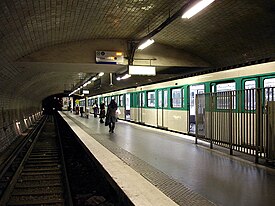Porte Dauphine (Paris Métro)
| Paris Métro station | |||||||||||
 |
|||||||||||
| Other names | Maréchal de Lattre de Tassigny | ||||||||||
| Location |
16th arrondissement of Paris Île-de-France France |
||||||||||
| Coordinates | 48°52′17″N 2°16′36″E / 48.87139°N 2.27667°ECoordinates: 48°52′17″N 2°16′36″E / 48.87139°N 2.27667°E | ||||||||||
| Owned by | RATP | ||||||||||
| Operated by | RATP | ||||||||||
| Other information | |||||||||||
| Fare zone | 1 | ||||||||||
| History | |||||||||||
| Opened | 12 December 1900 | ||||||||||
| Services | |||||||||||
|
|||||||||||
| Location | |||||||||||
Porte Dauphine (Maréchal de Lattre de Tassigny) is a station of the Paris Métro. It is the western terminus of Line 2. Nearby, one can transfer to the RER C at Avenue Foch station (with no direct transfer). Paris Dauphine University is nearby.
The station contains one of the only two remaining aedicules originally designed by Hector Guimard (1867–1942), the Art Nouveau architect who was originally commissioned by the Compagnie du Métropolitain de Paris (CMP) in 1899 to design the entrances for the Métro stations. (The other is at Abbesses.)
The Porte Dauphine station was inaugurated on 13 December 1900. At the time, Line 2 had only been completed as far as Charles de Gaulle – Étoile. It now runs from Porte Dauphine around the northern part of Paris, through Montmartre, around to its eastern terminus at the Place de la Nation. It is named after Porte Dauphine, a gate in the 19th-century Thiers wall of Paris. Its subtititle honours Maréchal de Lattre de Tassigny.
Art Nouveau aedicule designed by Hector Guimard
MF 2000 rolling stock arriving at Porte Dauphine
Porte Dauphine station, designed by Hector Guimard
Porte Dauphine station, designed by Hector Guimard
...
Wikipedia

